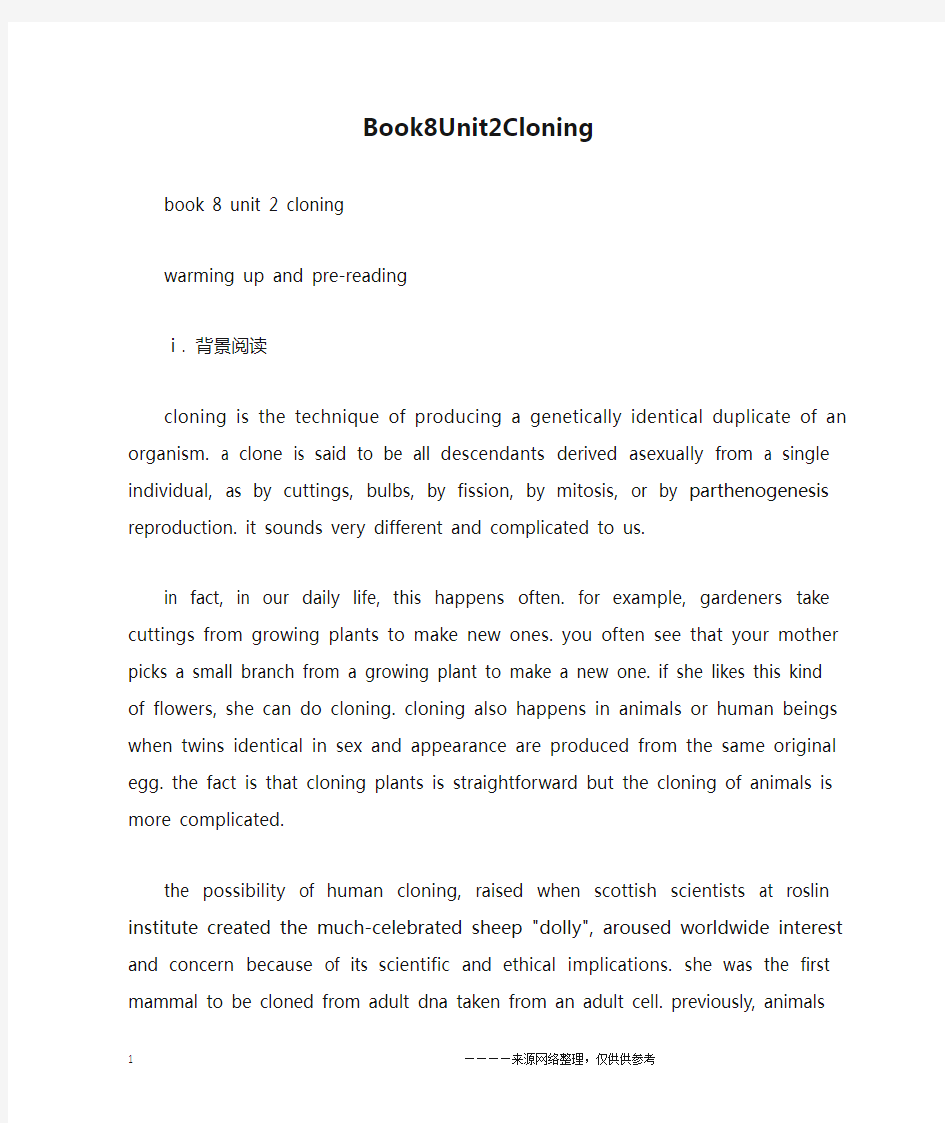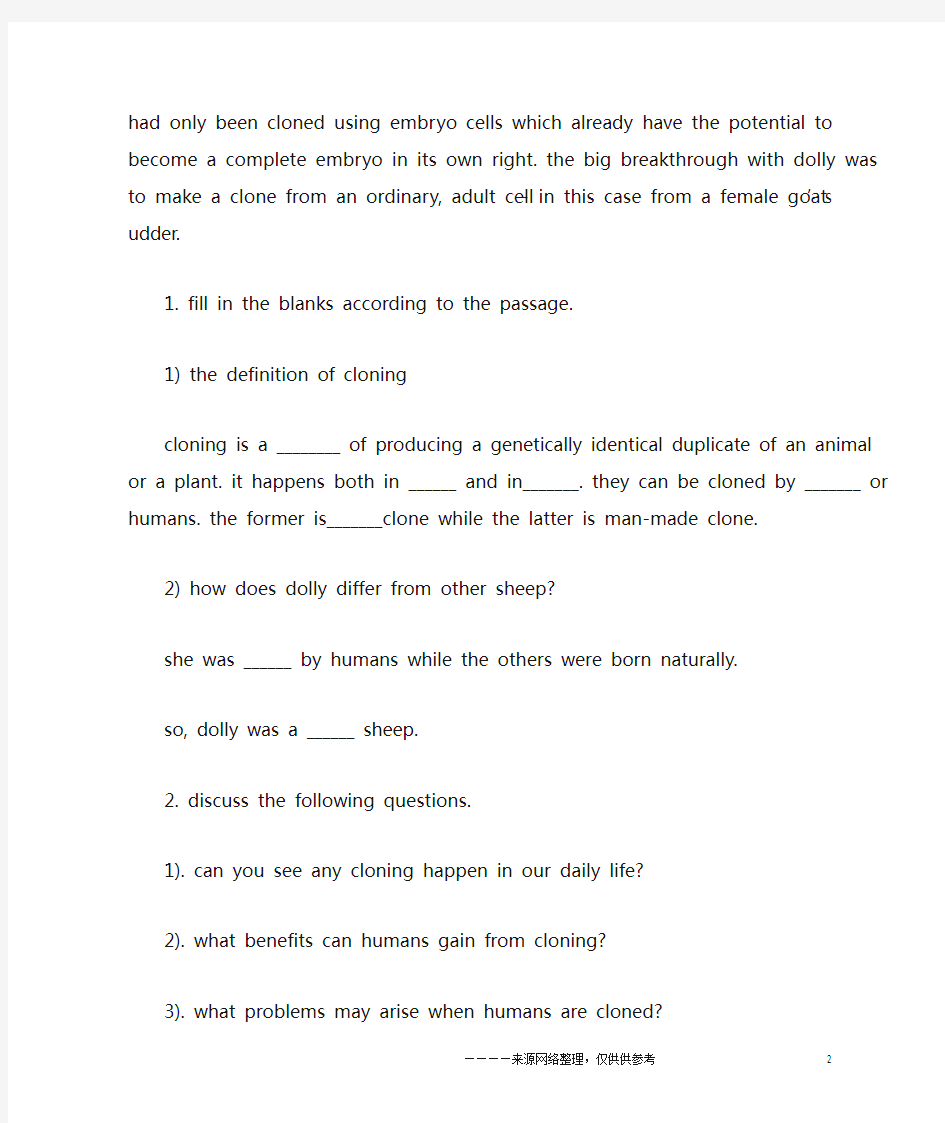Book8Unit2Cloning


Book8Unit2Cloning
book 8 unit 2 cloning
warming up and pre-reading
ⅰ. 背景阅读
cloning is the technique of producing a genetically identical duplicate of an organism. a clone is said to be all descendants derived asexually from a single individual, as by cuttings, bulbs, by fission, by mitosis, or by parthenogenesis reproduction. it sounds very different and complicated to us.
in fact, in our daily life, this happens often. for example, gardeners take cuttings from growing plants to make new ones. you often see that your mother picks a small branch from a growing plant to make a new one. if she likes this kind of flowers, she can do cloning. cloning also happens in animals or human beings when twins identical in sex and appearance are produced from the same original egg. the fact is that cloning plants is straightforward but the cloning of animals is more complicated.
the possibility of human cloning, raised when scottish scientists at roslin
institute created the much-celebrated sheep "dolly", aroused worldwide interest and concern because of its scientific and ethical implications. she was the first mammal to be cloned from adult dna taken from an adult cell. previously, animals had only been cloned using embryo cells which already have the potential to become a complete embryo in its own right. the big breakthrough with dolly was to make a clone from an ordinary, adult cell ?in this case from a female goat’s udder.
1. fill in the blanks according to the passage.
1) the definition of cloning
cloning is a ________ of producing a genetically identical duplicate of an animal or a plant. it happens both in ______ and in_______. they can be cloned by _______ or humans. the former is_______clone while the latter is man-made clone.
2) how does dolly differ from other sheep?
she was ______ by humans while the others were born naturally.
so, dolly was a ______ sheep.
2. discuss the following questions.
1). can you see any cloning happen in our daily life?
2). what benefits can humans gain from cloning?
3). what problems may arise when humans are cloned?
4). should we clone a human?
5). could cloning replace sex as the means of creating new human life?
6). could a parent clone a child who is dying of a terminal illness?
reading
i. reading comprehension:
1. the main idea of the text is____
a. animal cloning is very valuable and can benefit the world. 共19页,当前第1页12345678910111213141516171819
b. animal cloning could be misused by bad people so it must be forbidden.
c. animal cloning is well developed because dolly the sheep was born.
d. animal cloning raised arguments and scientists are not sure about its futur
e.
2.the cloning of dolly the sheep succeeded because____. a. its easier to clone a sheep than other animals b. the scientists were determined and worked hard with patience
c. the scientists were rewarded and got lots of money
d. many other attempts to clone mammals failed
3. what is the writer’s attitude toward cloning in this passage?
a. the writer is against cloning.
b. the writer is in favor of cloning.
c. the writer is neutral towards cloning.
d. the writer is in agreement with cloning.
4. which of the following is not an advantage of cloning?
a. cloning can be used for medical purposes.
b. large quantities of food can be produced by cloning.
c. cloning can help keep animals from becoming extinct.
d. people can clone themselves at will.
5. we can infer from the last three paragraphs that ___.
a. the normal development of dolly had no effect on the cloning of other species.
b. dolly’s serious disease and final death disturbed the whole world.
c. dolly successfully cloned a new lamb with the help of cloning scientists.
d. there were arguments about animals about animal cloning and
concerns about the future of cloning.
6.what is the writing style?
a. expositive (说明性的)
b.descriptive 共19页,当前第2页12345678910111213141516171819
c. argumentative (议论性的)
d. narrative
ii. fast reading: true or false questions
1. cloning means making a copy of an animal or a plant.
2. gardeners can make a lot of money by cloning plants.
3. cloning animals is as complicated as cloning plants.
4. dolly the sheep was the first successful clone of a mammal.
5. natural clones happen in animals as well as in plants.
iii. fill in the chart using the information from the text. add one reason of your own in each column.
problems or dangers of cloningadvantages of cloning
animals may_______
_____ ________ of older animals.medical cloning could _______ ______?????____ for serious degenerative(变质的)________ in humans.
animal clones may ______
_________ than the donor animalscloning plants can ______
_________ of similar _________ ______ ______ .
________ ________ may want to clone themselves.cloning plants can be _______ for research on _______ ______ ________ .
there are ________ __________ to cloning human beings.cloning can help save ___________ _________ .
ⅳ. writing
用大约30个词概括课文的内容,然后根据以下要求写一篇文章。
内容:
1.人们对克隆的看法
2.你对克隆所持的观点。
要求: 词数:120
题目自拟
___________________________________________________________ ___________________________________________________________ ___________________________________________________________
___________________________________________________________ ___________________________________________________________ ___________________________________________________________ ___________________________________________________________ ___________________________________________________________ ___________________________________________________________ ___________________________________________________________ ___________________________________________________________ ___________________________________________________________ ___________________________________________________________ ___________________________________________________________ ___________________________________________________________ ___________________________________________________________ ___________________________________________________________ ___________________________________________________________ __________________________________________共19页,当前第3页12345678910111213141516171819
___________________________________________________________
___________________________________________________________ ___________________________________________________________ ___________________________________________________________ ___________________________________________________________ ___________________________________________________________ ___________________________________________________________ ___________________________________________________________ ___________________________________________________________ _____________________
language points of reading 1
1.differ vi. 不一致, 不同, 相异, 不同意, 意见相左
常见的搭配有:
a and
b differ in …
a differs from b
sb differ from/ with sb on/ about / over /upon sth
拓展: different adj.
difference n.差异, 差别, 分歧, 争论, 差额
be different from 与…不同
make no difference to sb. 对没有影响
make a difference起作用,产生影响
即时练习:用介词from, with, on, about, upon 或in 填空。
(1) we differ _________ him _________ that question.
(2) the two nations differ ______ culture and religion.
(3) the climate here differs ___________ that of the south.
2. undertake vt.实施,从事,着手做,承担, 担任, 许诺, 保证,采取,答应
undertake sth 承担某事
undertake a task/ project 承担一个任务/项目
undertake to do sth 许诺做某事/ 同意做某事
undertake that …保证…
即时练习:完成下列句子。
?he will _________ __________ ??__________ next month (去旅行).?he _________ __________ ___________ ____________(承担了一项新任务).
?我愿意承接这项变革的责任。
?i can _______ ________ __________ for the changes.
?他许诺当我们的向导.
?he _________ _________ _________our guide .
3.disturb vt. 扰乱, 使不安, 弄乱
disturbed adj. 被乱的, 动乱的, 不安的
disturbing adj. 令人不安的/ 烦扰
即时练习:用disturb, disturbing, disturbed填空。
(1) i’m very __________ about alice.
(2) don’t _________ the papers on my desk.
(3) this country is in a ____________ state.
(4) what ____________ news it is!
(5) a light wind ___________ the surface of the water.
4. cast down:feeling unhappy and depressed使沮丧, 低沉,使下降, 推翻
be cast down = feel discouraged
实验失败使得他很沮丧。
he was much cast down by the failure of the experiment.
不要沮丧。继续保持你的精神。
don’t be so cast down. just keep up your spirits.
即时练习:将下列句子译成英语
(1) 听到这个消息他很沮丧。共19页,当前第4页12345678910111213141516171819
___________________________________________________________ _____
(2) 发现事情的真相使他很沮丧。
___________________________________________________________ _____
拓展:
?cast away丢弃, 抛弃, 使失事, 使漂流
?cast off 放弃;丢弃, 摆脱
?cast out赶走, 驱逐
5. altogether dolly lived for six years, …
altogether adv.
①全部,总共
?这个中心区在这次飓风中失去了1000多棵树。
?__________________________________________________________②总而言之
?总之,我们的成就是巨大的。
?__________________________________________________________③完全地(completely)
?他并不完全确信接下去做什么。
?__________________________________________________________区别: all together与altogether
①作“总共”解时,它们可以互换使用。
?there were altogether/ all together 42 students in the class.
我们班总共有42个学生。
②all together作“一道,一起”解时,不能用altogether替换。?they came all together. 他们一起来。
③altogether意为“完全地,彻底地,总之,总而言之”,不可与all together互换,用于否定句时是部分否定。
?it’s altogether out of the question. 它完全不可能。
?i don’t altogether agree with you. 我并不完全赞同你的看法
6. forbid vt. (forbade /forbad, forbidden, forbidding) 禁止,不准,不许forbid sth.
forbid doing sth.
forbid sb. to do sth.
forbid that…
smoking should be forbidden in public places. 公共场所应禁止吸烟。
i forbid you to tell anyone. 我不准你告诉任何人
the law forbids building on this land. 法律禁止在这块土地上建筑。即时练习:完成下列句子
?(1) the school __________ ___________ ___________ ??__________ ___________ (禁止学生吸烟).
?(2) he is forbidden ________ __________ _____________ ___________ (进入这个房间).
7. in favour of 赞成;有利于(与against相对)
is he in favour of the plan? 他赞成这项计划吗?
拓展:
in sb’s favor对某人有利
do sb a favor =do a favor for sb 帮某人忙做
in favor with sb.受某人支持
即时练习:将下列句子译成英语
目前我没有得到大家的支持。
___________________________________________________________ _____
今天你能帮个忙去学校接迈克吗?
___________________________________________________________ _____
8. object to 反对;不同意
object to sb/sth 反对/不赞成某人某事
object to doing sth 反对做某事
object to sb doing sth反对某人做某事
have/make an objection to (doing) sth对表示反对共19页,当前第5页12345678910111213141516171819
即时练习:将下列句子译成英语
学生反对像孩子似地被对待。
___________________________________________________________ ____
我们反对因为一个人的错误而惩罚整个班级。
___________________________________________________________ ____
reading ii
ⅰ. answer the following questions:
1. do you like dinosaurs? where have you seen them? can you see them in our real life? why?
2. do you think it is possible to clone dinosaurs? if yes, do you think that’s good for human beings? why?
ⅱ.fast reading
1.the writer of the text_____
a. is excited by the possibility of cloning fierce and extinct animals
b. believes that extinct animals can be brought back to life by cloning
c. thinks it impossible or unsuitable to clone extinct animals like dinosaurs
d. dreams of dinosaurs returning to the earth
2. the film jurassic park is popular because _____.
a. people are interested in the subject of cloning
b. all the actors are dinosaurs
c. it was directed by a scientist who clones dinosaurs
d. it proves very interesting
3. which of the following is true? ____
a.mice were cloned in 1981.
b. dolly the sheep was the first cloned animal.
c. the name of the cloned cow is “bison”
d. china was successful in cloning mammals.
4. the reasons why a group of cloned animals all die of the same illness do
not include____. 共19页,当前第6页12345678910111213141516171819
a. they have the same arrangement of genes
b. there isn’t enough diversity in the group for it to overcome illnesses
c. the illness is a new one
d. their arrangement of genes can not resist that new disease
5. we can infer from the text that____
a. scientists are experimenting to clone dinosaurs
b. dinosaurs will never return to the earth
c. cloned animals will only live in the zoo
d. the dna of dinosaurs can only survive 10, 000 year
ⅲ. language points
1.from time to time = occasionally, now and then有时, 间或, 偶尔,
2.in vain [in'vein]徒然,白费,无效
day after day she______ ______ _________ for him to telephone her.
日复一日,她徒劳地等待他的电话。
they endeavoured to make her happy_______ ________ ______他们尽量使她快乐,却徒劳无功。
all our work_________ __________ _________我们的工作全都白干了。
3.resist
1) 抵抗
to resist or not to resist japan? 要不要抗日?
2)抗(酸),耐(热等)
this special coating is designed _________ ________ rust.
这一特别的涂层旨在抗锈。
a healthy body ________ disease. 健康的身体能抵御疾病。
3) (常用于否定句)忍耐,忍住[+v-ing]
i ________ __________the temptation to tease ollie. 我忍不住要逗奥利玩
4. base on/upon 以……为基础, 依据
base sth. on/upon…
sth. is based on/upon…
单元词组复习
翻译词组:
1,使沮丧____________________________________
2,赞成,支持____________________________________
3,反对____________________________________
4,一定;注定____________________________________
5,不时____________________________________
6,使复生____________________________________
7,在另一方面____________________________________共19页,当前第7页12345678910111213141516171819
8,把…建立在…基础上____________________________________ 9,值得做某事____________________________________
10,通过(方式)____________________________________
11, 一直,总是____________________________________ grammar
聚焦名词性从句
[讲一讲] 同学们在学习和使用名词性从句时要特别注意以下几点:1. 注意连接词that与what的区别:
that在引导名词性从句时,只起连接作用,不在从句中作任何成分;what在引导名词性从句时不仅起连接作用,而且在从句中充当主语、宾语、表语等。如:
see the flags on top of the building? that was what we did this morning. (what作did的逻辑宾语)
what makes this shop different is that it offers more personal services. (what引导主语从句,且在主语从句中作主语)
2. 注意连接词whether与if的区别:
whether可引导所有的名词性从句,if一般只能引导宾语从句。在引导宾语从句时两者常可互换,但介词后的宾语从句只能用whether引导;此外,whether后可直接用or not, if则不行。如:
the question is whether he will accept our invitation and come to our party. (whether引导表语从句,一般不用if代替)
can you tell me whether or not the train has left? (与or not直接连用,只能用whether)
3. 注意名词性从句与定语从句的区别:
名词性从句相当于一个名词,在句中可以充当主语、宾语、表语等,而定语从句相当于一个形容词,在句中充当定语。
有些连接词如that, which, where, when等,既可引导名词性从句又可引导定语从句;还有些连接词如what, whatever等,不能引导定语从句。如:
he promised to do everything that he could do to help us out. (that引导定语从句)
he promised to do whatever he could do to help us out. (whatever引导宾语从句)
the coat is still where you have left it. (where引导表语从句)
the coat is still in the room where you have left it. (where引导定语从句) [巩固练习]
exercise 1
下列各句均有一处错误,请指出并改正。
1. what fashion differs from country to country may reflect the cultural differences from one aspect.共19页,当前第8页12345678910111213141516171819
